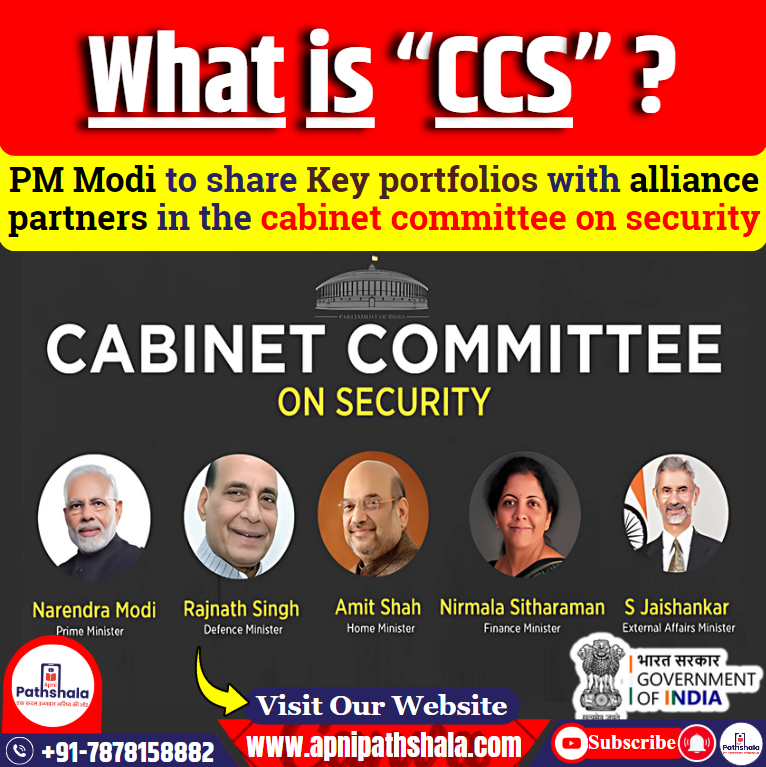What’s in this Article?
- Table of Contents
- Why in the News?
- What are the Cabinet Committees?
- Evolution of Cabinet Committees in India’s Governance
- There are 8 Cabinet committees at present-
- Characteristics of Cabinet committees
- Presidency and Functions
- About Cabinet Committee on Security (CCS)
- Why is CCS so important?
- Have alliance partners been part of the CCS earlier?
Why in the News?
- After the swearing-in ceremony of PM Modi, he is set to share the four big portfolios of Home, Defence, Finance, and External Affairs with its alliance partners.
What are the Cabinet Committees?
- Cabinet committees in India are groups of ministers formed by the Prime Minister to handle specific tasks or issues more efficiently.
- The PM sets up these committees with selected members of the Cabinet and assigns specific functions to these committees.
- The PM may change the number of committees, and modify the functions assigned to them.
- Usually, only Cabinet ministers are members of these committees. However, non-Cabinet ministers are not unheard of to be members or special invitees to committees.
- If the PM himself is a member of any such committee, he acts as the head of that committee.
Evolution of Cabinet Committees in India’s Governance
- Cabinet committees operate under the Government of India Transaction of Business Rules, 1961.
- These committees are categorized as Standing (Permanent) or Ad-Hoc (Temporary).
- They are established based on Article 77(3) of the Constitution, allowing the President to make rules for efficient transaction of government business and allocation among ministers.
- Membership varies from three to eight, predominantly comprising Cabinet ministers, with the Prime Minister often presiding.
- The number, terminology, and composition may change over time.
- Note: All Cabinet Committees except the Cabinet Committee on Accommodation and the Cabinet Committee on Parliamentary Affairs are headed by the Prime Minister.
There are 8 Cabinet committees at present —
- Appointments Committee of the Cabinet (composed of the PM (ex-officio Chairman) and the Minister of Home Affairs),
- Cabinet Committee on Economic Affairs (headed by the PM himself),
- Cabinet Committee on Political Affairs (headed by the PM),
- Cabinet Committee on Investment and Growth,
- Cabinet Committee on Parliamentary Affairs,
- Cabinet Committee on Employment & Skill Development,
- Cabinet Committee on Accommodation, and
- Cabinet Committee on Security.
- The Committees on Investment and Employment were innovations introduced in 2019 by the Modi government.
Characteristics of Cabinet committees
- These are extra constitutional as they are not specified in the Constitution. However, the Rules of Business provide for its formation.
- They are of two types: Standing and Ad hoc. Whereas the latter are transient in nature, the former are permanent. Ad hoc committees are occasionally formed to address certain issues. When their mission is accomplished, they split off.
- Usually, only Cabinet ministers are members of these committees. However, it is not unheard of for non-Cabinet ministers to be members or special invitees to committees.
Presidency and Functions
- They are generally led by the Prime Minister. Occasionally, their Chairman is also one of the other Cabinet Ministers, mainly the Finance or Home Ministers. However, if the prime minister is on a committee, he is always the one in charge of it.
- The committees resolve issues and formulate proposals for the consideration of the Cabinet and take decisions on matters assigned to them. The Cabinet is empowered to review such decisions.
About Cabinet Committee on Security (CCS)
- Head of the Committee: The Prime Minister assumes the role of the committee’s head.
- Membership: Cabinet ministers of Finance, Defense, Home Affairs, and External Affairs serve as members.
- Key Responsibilities: The committee addresses issues related to law and order, internal security, and foreign affairs policy with security implications, including matters concerning atomic energy.
- Economic and Political Considerations: It also examines economic and political issues relevant to national security.
- Financial Oversight: The CCS reviews cases involving capital defence expenditure exceeding Rs 1,000 crore.
- Departmental Considerations: Additionally, it evaluates matters concerning the Department of Defence Production, Department of Defence Research and Development, Services Capital Acquisition plans, and procurement of security-related equipment.
Why is CCS so important?
- With the Prime Minister helming it, the CCS has the ministers for Finance, Defence, Home Affairs and External Affairs as its members.
- It is responsible for debates, discussions and appointments of/ in the national security bodies.
- Major decisions with respect to the significant appointments, issues of national security, defence expenditure of India are taken by CCS.
- The CCS also brainstorms on issues relating to law and order and internal security, and policy matters concerning foreign affairs on security-related issues.
- It also considers matters relating to atomic energy.
Have alliance partners been part of the CCS earlier?
- The most notable example was the H D Deve Gowda government of 1996. Samajwadi Party’s Mulayam Singh Yadav became Defence Minister, P Chidambaram, who had formed the Tamil Maanila Congress earlier that year, became Finance Minister, and CPI’s Indrajit Gupta became Home Minister.
- In 2001, with Vajpayee heading the NDA government, Samata Party founder George Fernandes was appointed the Defence Minister and remained in the post for three years.
- In fact, as Defence Minister in the BJP-led second and third Atal Bihari Vajpayee ministries (1998–2004), he oversaw the Kargil War and the nuclear tests at Pokhran.
- However, the Congress kept all CCS positions in the UPA government, and the BJP had all four of these positions in the Modi governments.
MCQs
Q. Out of the following statements, choose the one that brings out the principle underlying the Cabinet form of Government:
(a) An arrangement for minimizing the criticism against the Government whose responsibilities are complex and hard to carry out to the satisfaction of all.
(b) A mechanism for speeding up the activities of the Government whose responsibilities are increasing day by day.
(c) A mechanism of parliamentary democracy for ensuring collective responsibility of the Government to the people.
(d) A device for strengthening the hands of the head of the Government whose hold over the people is in a state of decline.
Disclaimer: The article may contain information pertaining to prior academic years; for further information, visit the exam’s “official or concerned website“.
Explore our courses: https://apnipathshala.com/courses/
Explore Our test Series: https://tests.apnipathshala.com/








